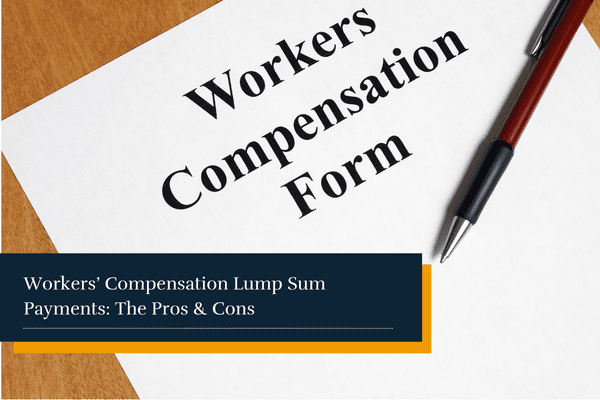
In Pennsylvania, if you are already receiving workers’ compensation benefits, you may be entitled to waive future payouts of those benefits in exchange for a lump-sum settlement. While a lump sum payment may sound enticing, there are also potential drawbacks. This page highlights some key considerations to keep in mind when deciding which route is right for you.
What Is a Lump Sum Settlement?
In Pennsylvania, most employees who suffer on-the-job injuries are entitled to workers’ compensation benefits. These benefits typically come in the form of weekly or bi-weekly payments. However, insurance companies may offer workers a lump sum or a structured settlement instead. A lump sum workers’ compensation payment can settle medical expenses, wage loss benefits, or both.
In Pennsylvania, Compromise and Release Agreements, which are used to authorize lump sum settlements, may only be offered after a worker misses four months of work due to injury. If an injured worker accepts a lump sum settlement, they give up their right to receive ongoing wage and medical benefits in exchange for a guaranteed, one-time payout.
Pros of Lump Sum Settlements
Understanding the pros and cons of a lump sum workers’ compensation payment can help you make an informed decision that serves your best interests. Here are some of the pros that come with accepting a lump-sum settlement:
- You receive a large sum of money upfront for any necessary and immediate expenses.
- You no longer have to rely on your employer or their insurance carrier for medical or wage loss benefits.
- You have more control over how and when you receive your settlement money.
- You get peace of mind from knowing exactly what you will receive upfront.
Cons of Lump Sum Settlements
Injured workers may feel tempted when insurers offer lump sum settlements for workers’ compensation cases. However, it is not always in their best interest to accept. Consider these downsides before agreeing:
- You cannot turn around for additional benefits or seek more money later.
- You will see a decrease in Social Security Disability benefits if the lump sum payment is large enough.
- You may accept an amount insufficient to cover your future medical bills or lost income.
So, Should You Settle Your Workers’ Compensation Case?
Injured workers who have reached their maximum medical improvement (MMI) often find a lump sum payment more beneficial. The main advantage of settling a workers’ compensation case in this way is that it offers a guaranteed amount of money and can provide some degree of closure for the injured worker. However, in some cases, the amount offered may not cover their total medical costs, and they may have to pay out of pocket for additional expenses. Further, once they accept a lump sum settlement, they waive all future rights to benefits related to the injury. There is no going back.
When deciding whether to settle a workers’ compensation case with a lump sum payment, you should first discuss your situation with an experienced attorney. Each workers’ compensation case is unique, and the right decision varies depending on each injury victim’s needs.
Contact the Pennsylvania Workers’ Compensation Lawyers at Calhoon and Kaminsky, P.C.
At Calhoon and Kaminsky, P.C., we have decades of experience helping our clients handle the legal aftermath of workplace injuries and illnesses. Contact our Pennsylvania workers’ compensation lawyers today to schedule your free consultation and learn more about how we can help you with your case.
- About the Author
- Latest Posts

